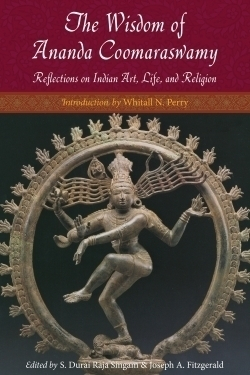The Wisdom of Ananda Coomaraswamy
Reflections on Indian Art, Life, and Religion
- 2011 INDIES Finalist
- Finalist, Religion (Adult Nonfiction)
The most urgent practical task of the philosopher, according to Ananda K. Coomaraswamy, is a re-formulation and revision of the principles of comparative religion in order to “demonstrate the common metaphysical basis of all religions,” and show how all diverse cultures are merely “the dialects of a common spiritual and intellectual language.” His years of study of world Scriptures and the works of great philosophers through the ages led him to believe that “there is one truth that shines through them all in many shapes, a truth greater in glory by far than can be circumscribed by any creed or confined by the walls of any church or temple.”
Born in 1877 in Ceylon (now Sri Lanka) to an aristocratic Englishwoman and one of Ceylon’s leading men, Coomaraswamy was raised as an Englishman; after graduating from London University and working for a time in Sri Lanka, he became the Keeper of Indian and Islamic Art at the Boston Museum of Fine Arts. He was also a pioneering scholar in the fields of Indian art, culture, and religion, and an expert in comparative religion. While he called himself “almost as much of a Platonist and Medievalist as … an Orientalist,” he became an outspoken advocate for Indian history, traditions, and culture, seeking to awaken the world to their beauty and value; more importantly, he sought to renew the respect and honor that was India’s due among her own people, who, after years of British rule, had become fascinated with Western ways.
It would be difficult for the Western reader to find a more eloquent and readable statement of the inherent worth and value of Indian art, culture, and religion than can be found in this anthology of selections from Coomaraswamy’s many letters, speeches, and other writings. With his feet firmly planted in the soil of two divergent worlds, Coomaraswamy was able to glean the best from each; his clarity of vision and his ability to recognize what was true and of lasting value in each culture allowed him to critique, unflinchingly, what many in his day considered to be “progress.”
Western society’s rampant consumerism was without appeal for Coomaraswamy, who hoped that, at retirement, he and his wife would live out their days in a simple, if not ascetic, manner in northern India; his death in 1947 precluded that move.
This small, attractive, and richly-illustrated volume is an accessible and powerful introduction to Coomaraswamy’s vision of India. Its greatest benefit for the modern reader lies in its heart-felt invitation, and compelling challenge, to evaluate Western ideas and ideals in the light of an older, much richer culture.
Reviewed by
Kristine Morris
Disclosure: This article is not an endorsement, but a review. The publisher of this book provided free copies of the book and paid a small fee to have their book reviewed by a professional reviewer. Foreword Reviews and Clarion Reviews make no guarantee that the publisher will receive a positive review. Foreword Magazine, Inc. is disclosing this in accordance with the Federal Trade Commission’s 16 CFR, Part 255.

